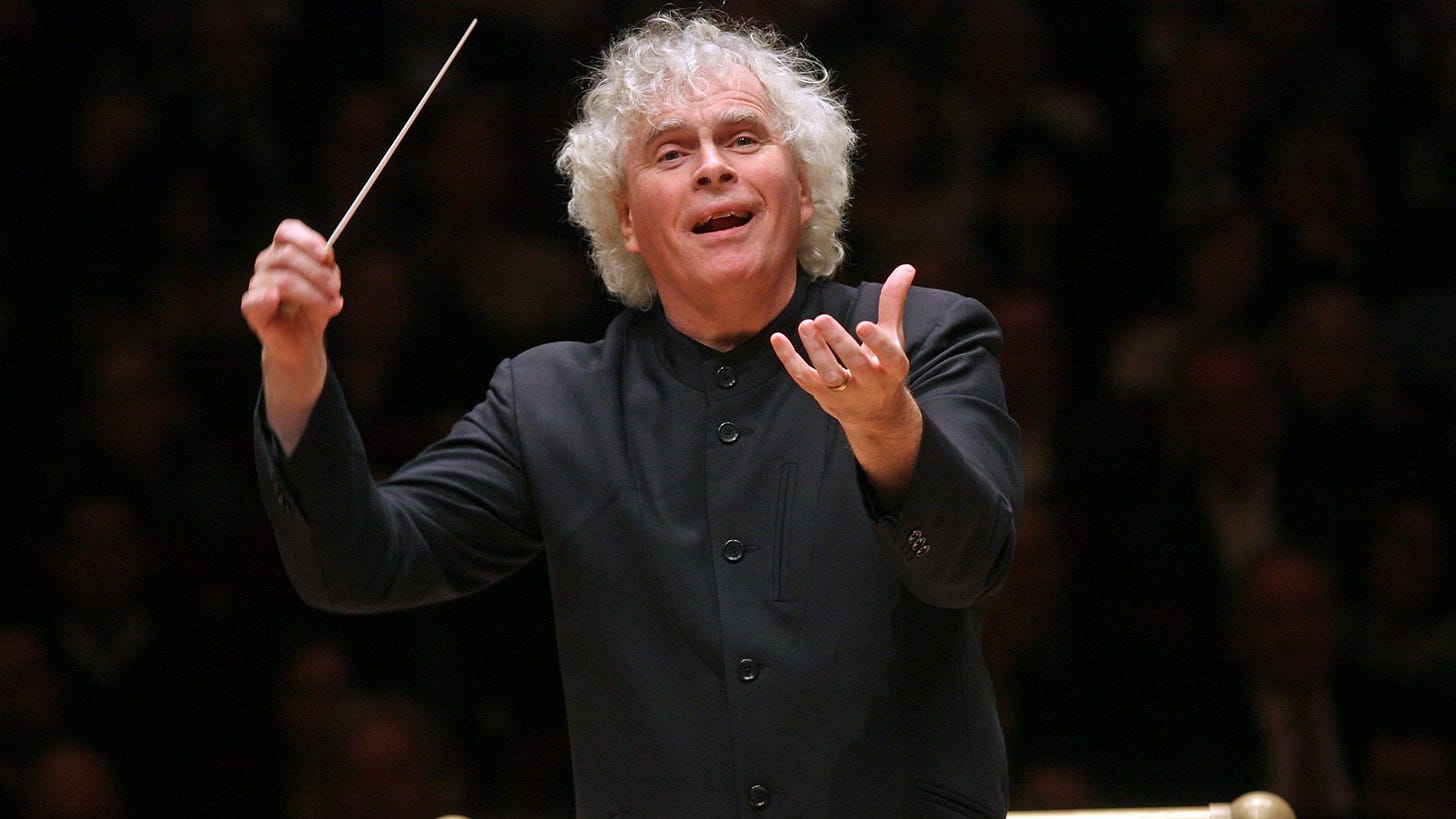How Simon Rattle Ruined the Berlin Philharmonic
Or, a short essay on the delusions of provincial British music criticism
If you ask people to rank the world’s greatest orchestras, a good sixty percent of people are going to put the Berlin Philharmonic at the top. It makes sense, too. Their playing is at a high level, they had the hell marketed out of them by Deutsche Grammophon, and they worked with legendary figures like Herbert von Karajan and Wilhelm Furtwängler, the earlier of which raised the orchestra to near-legendary status, and it’s really thanks to him that the orchestra became the symbol of European classical music as a whole.
That being said, what happened to them?
After Karajan left and Claudio Abbado took over (and fired about ⅓ of the players), the orchestra lost its very distinct sound, which prioritized a luscious string sonority over just about everything and anything else (sometimes at the risk of losing textural clarity), the Berlin Philharmonic just turned into any other orchestra. They sound bored. There is nothing about them that says “hey, we’re the Berlin Phil, the world’s best orchestra, and this is what we sound like.” Their string sound is flaccid, their horns are polished but without fire, the woodwinds are practically catatonic, and their percussion section can’t play loud. Much of this has to do with the fact that the orchestra is still kind of modeled in Abbado’s sonic preferences (which overall is not a bad thing, he made a few really great recordings in with the orchestra), but more to the fact is that the orchestra probably made the greatest mistake in its history in 1999 (besides, you know, becoming a tool of the Nazi regime) hiring Simon Rattle.
While I can’t say much about Simon Rattle in concert, I can say some things about who he is as a musician, both in rehearsal and on disc. But first, it’s necessary to give you a little bit of history about Simon Rattle’s career and supposed gifts as a musician.
Simon Rattle got his career started with the City of Birmingham Symphony Orchestra, which through tireless dedication and hard work over his many years with that ensemble, he raised from third-rate to second-rate. He made absolutely no great recordings during that period in his career (with the exception, for some weird reason, of a bunch of the music of Karol Szymanowski), but he had the British musical and critical establishment behind him that would publish good reviews telling us how much of a genius he was whenever he made a new recording. 99% of the time they weren’t good, most of them are pretty much forgotten about in the present day. The reason why this was so important is that at one point, Britain (and more specifically London) was the center of the classical music world, at least for English speakers. Both Decca Records and EMI were based in London, and so was Gramophone Magazine, which, despite its dishonest criticism and almost laughable opinions, still is the most influential classical music magazine around. So, they took Simon Rattle, who is a charismatic personality with a moderate level of talent (but a very clear lack of taste), and basically ignored the quality of the music he was putting out, which was usually very, very, low and published extremely laudatory reviews that made us all think that he was better than he actually was.
How many of Rattle’s recordings with Berlin or Birmingham are considered references now, or even really great? Does anyone talk about his Mahler, or Beethoven, or anything else for that matter? It’s not that it was all terrible (although some of it was), it’s just that it was all mediocre—as a musician, outside of some very select repertoire, he’s just kind of faceless.
Considering the distinct sound that the Berlin Philharmonic used to have, with its incredibly rich and velvet-like timbral qualities under Herbert von Karajan, or the bass-heavy sound they had under Wilhelm Furtwangler, the Berlin Philharmonic currently lacks any distinct characteristics that makes them interesting to listen to. Yes, they are still a very high level and technically proficient ensemble, but all of their personality is gone. Abbado started this, and Rattle finished the job.
What Rattle lacks above all is a full conception of how a piece is supposed to go. He lacks a long-term plan and an understanding of musical structure. Listen to his Rite of Spring with Berlin (a piece which the Berlin Philharmonic has historically never done well) and compare it with Leonard Bernstein’s 1958 recording with the New York Philharmonic, and note Rattle’s lack of sharp articulation and rhythmic clarity. Compare his Schubert Symphony No. 9 in C Major with Berlin with Wilhelm Furtwangler’s studio recording or Herbert von Karajan’s recording with the same orchestra and take notice of Furtwangler’s phrasing and gripping intensity in comparison with Rattle’s tensionless and unsustained version.
The Berlin Philharmonic after Abbado was already a faceless ensemble, and the Orchestra had a chance to pick a conductor that would’ve given them a distinct corporate sonority and restored it to its former glory. But instead, Rattle continued Abbado’s tradition of mediocrity and drove the orchestra nearly into the ground.





firebomb british people